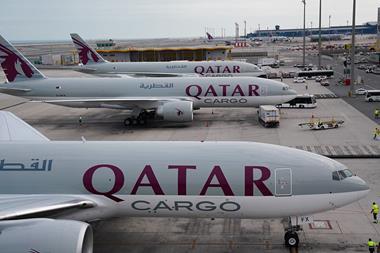Qatar Airways Cargo reported a 4.6% in cargo volumes in the fiscal year ending March 31 despite the loss of much of its bellyhold network due to the pandemic.
The cargo division of Qatar Airways handled a total of 2,727,986 tonnes of cargo in the 2020/21 fiscal year to maintain its position as the world's largest cargo carrier (freight operators FedEx and UPS leading the way when parcel volumes are taken into account).
The increase comes as the cargo business more than tripled its daily services at the peak of the pandemic, operating a record 183 flights in one day during the month of May 2020.
Qatar Airways Cargo also operated more than 1,100 charters during 2020/21 carrying over 53,000 tonnes of aid, medical supplies, food and live animals among other cargo.
It also added a further three B777 freighters to its fleet in January of this year, bringing its freighter operation to 24 B777Fs and two B747-8Fs.
The cargo carrier also converted six Boeing 777-300ER passenger aircraft into mini freighters to meet air cargo demand.
This increase in freight handled, as well as a significant increase in cargo yield, also saw the carrier’s cargo revenues more than double.
Revenues from scheduled cargo operations reached QAR18.5m from QAR9.9m in the previous fiscal year.
"With the pandemic causing a substantial decline in international passenger demand, the airline’s freight business has been a significant contributor to Qatar Airways Group’s revenue streams, maintaining the commercial viability of many of the airline’s global passenger routes," the airline said in its annual report.
The carrier also highlighted its investments in digital and sustainability.
"The freight carrier introduced several initiatives including online rate distribution, ad hoc rate automation, track and trace and availability via API," it said.
"In February 2021, Qatar Airways Cargo took a major digital leap, providing forwarders with real-time pricing, capacity, and e-bookings via WebCargo, marking a milestone in air cargo digitalisation."
The carrier has also launched its WeQare initiative, which has provided free transport of 1m kg of humanitarian aid and medical equipment to charitable organisations and free transportation for wild animals back to their natural habitats.
Qatar Airways Cargo also signed a five-year agreement with UNICEF to support the organisation’s Humanitarian Airfreight Initiative to prioritise the transport of vaccines, medicines, medical devices and critical supplies.
This was in addition to a two-year pact signed in May 2020 to support UNHCR to transport crucial aid supplies. The carrier has transported more than 20m doses of Covid-19 vaccines to over 25 countries.
Meanwhile, the overall Qatar Airways Group reported a net loss of QAR14.9bn, of which QAR8.4bn is due to a one-time impairment charge related to the grounding of the airline's Airbus A380 and A330 fleets.















